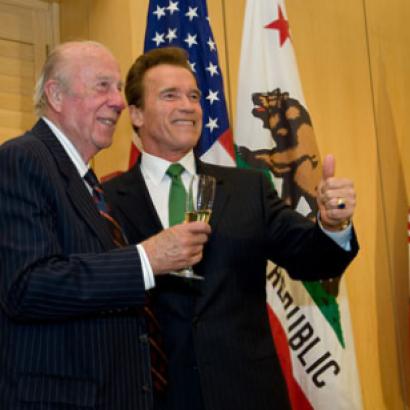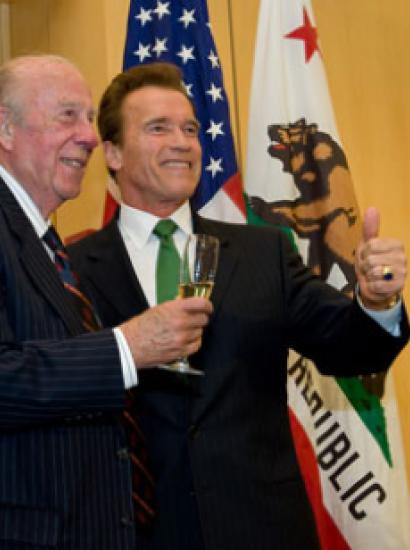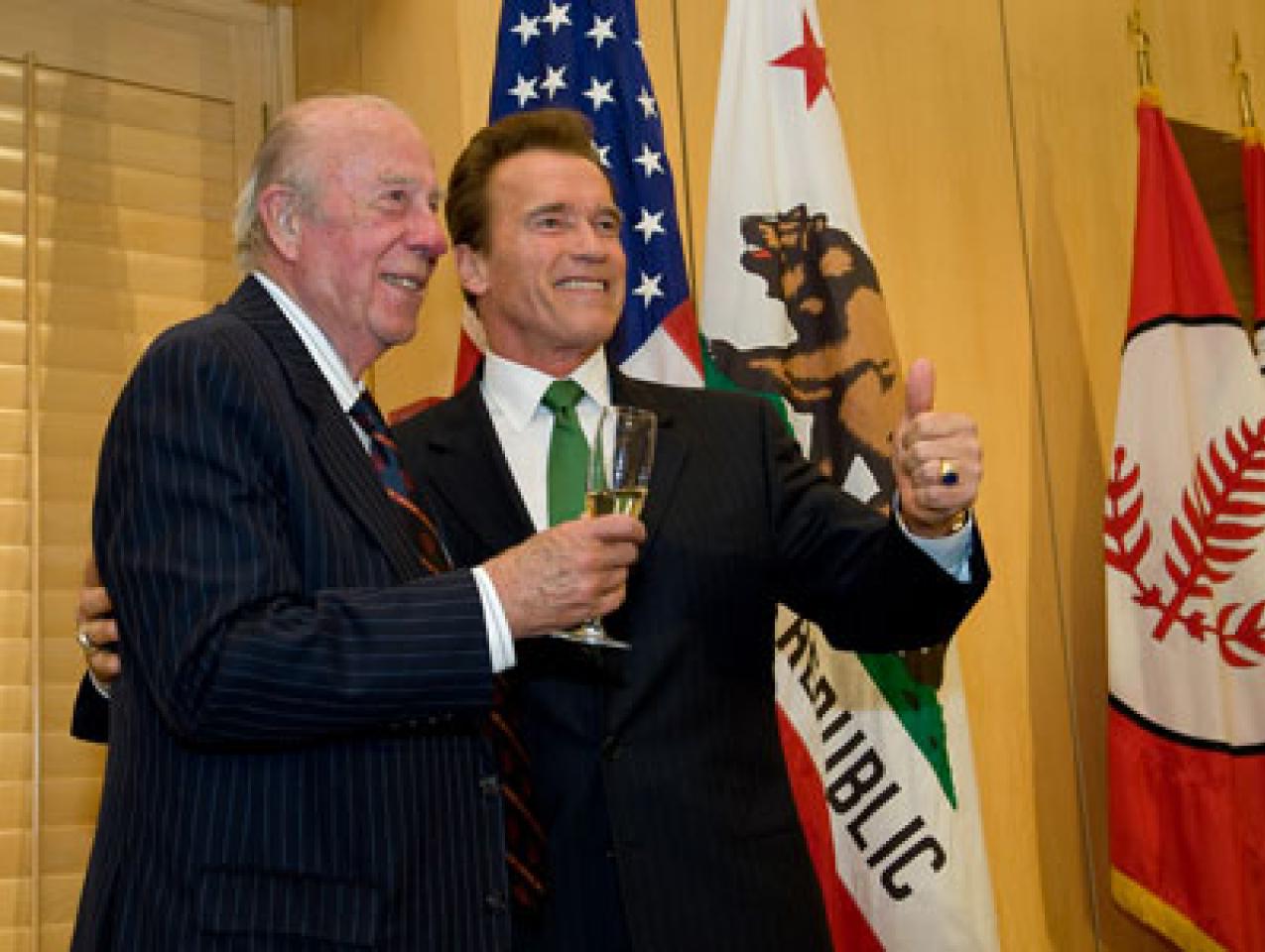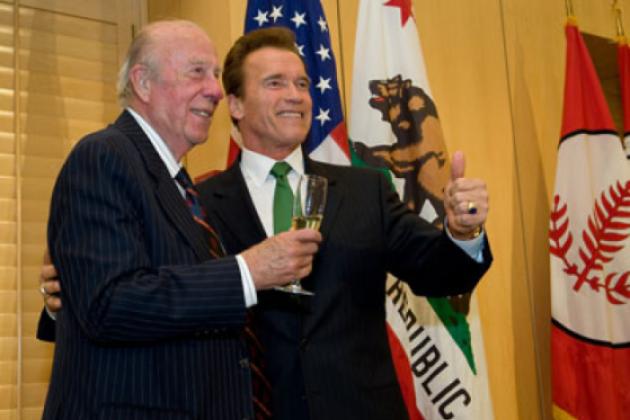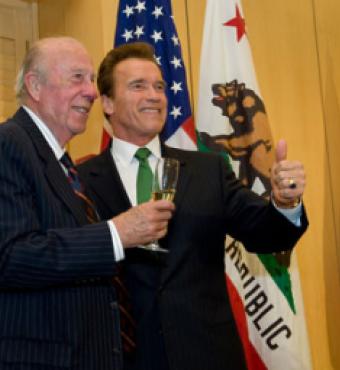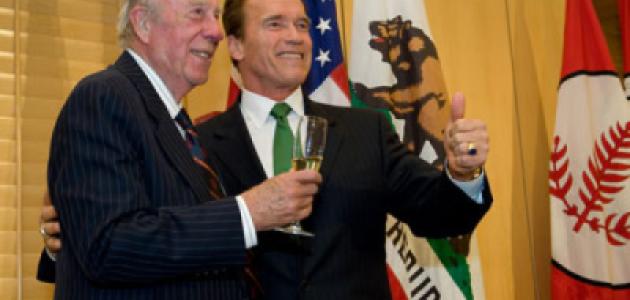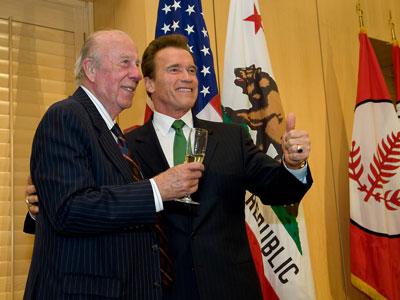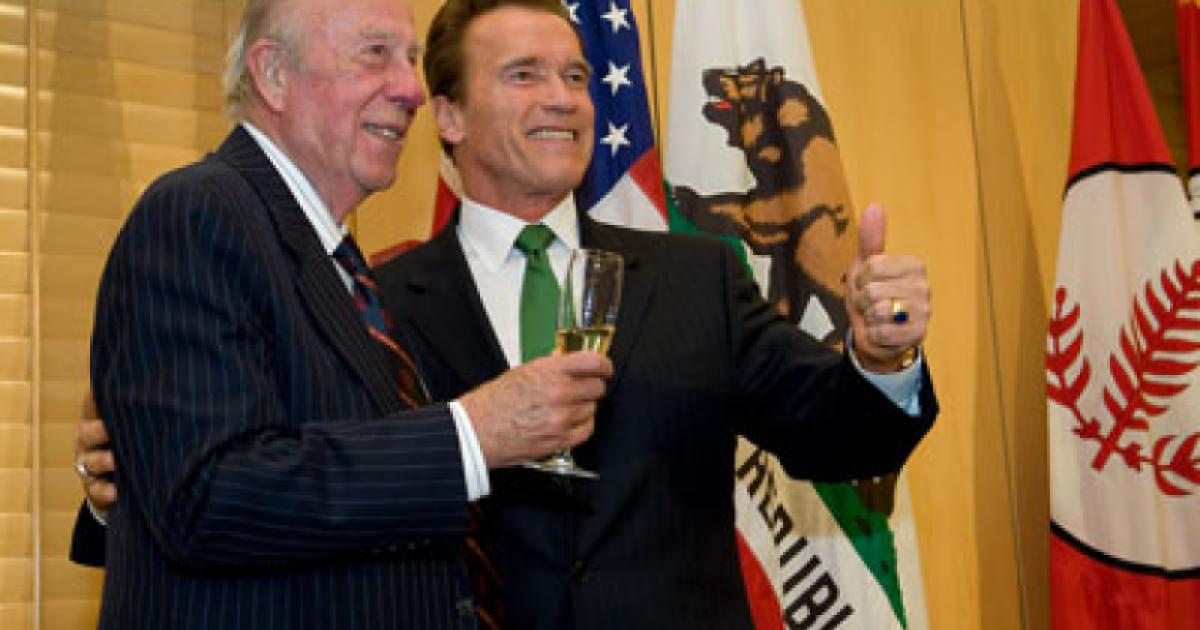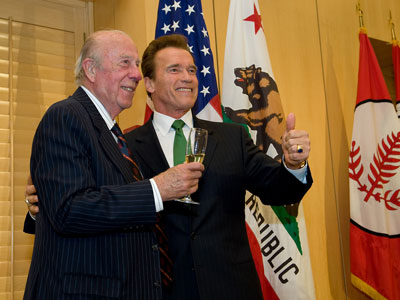
STANFORD—George P. Shultz, the Thomas W. and Susan B. Ford Distinguished Fellow at the Hoover Institution, was recognized for his lifetime of service in “Ideas and Action: A Symposium in Honor of George P. Shultz.” The Stanford event, cosponsored by the Hoover Institution and the Stanford Institute for Economic Policy Research, was held October 28-29 on the campus of Stanford University.
Governor Arnold Schwarzenegger, who gave the keynote address at a dinner on Thursday, October 28, attended by some four hundred of Shultz’s friends and colleagues, said that Shultz had been by his side for many years—since he endorsed Schwarzenegger’s candidacy for governor—sharing his wisdom. After he was elected, Schwarzenegger said, “George told me to compromise enough to get a deal done. He said I had to prove, to show right away off the top, that I can bring Democrats and Republicans together on an issue. George’s recommendation and his advice was always about coalition building.”
Schwarzenegger praised Shultz’s many accomplishments and his continued leadership on public policy and defense issues. In a line from one of his movies, he added, “George is ninety years old and doesn’t stop. After every big move, he says, ‘I’ll be back.’” Calling Shultz “my friend, my partner, my idol,” Schwarzenegger toast him with champagne.
Earlier, a panel discussion, titled “Innovation in Higher Education,” featured university presidents from institutions at which Shultz was either a student or held a faculty position. John Hennessy, Stanford University; Susan Hockfield, Massachusetts Institute of Technology (MIT); Shirley Tilghman, Princeton University; and Robert Zimmer, University of Chicago, participated in the panel. Gerhard Casper, Stanford University president emeritus and a member of the faculty with Shultz at the University of Chicago, moderated the event. Hoover senior fellow John Shoven, the Wallace R. Hawley Director of the Stanford Institute for Economic Policy Research, in his introductory remarks noted that Shultz has “made unique and major contributions to academic institutions.”
In his remarks at the symposium on Friday, October 29, Shultz called for “a country that’s resilient, institutions that are resilient, and individuals that are resilient.” When unexpected things happen, he said, resiliency allows for analysis of the events and turning them to one’s advantage. Shultz discussed issues of governance; strategic thinking on key matters, including demography, the state system, and the importance of research and development on the advancement of society; and challenges, in terms of national security, economy, and energy, facing society today.
In his opening remarks on the same day, John Raisian, the Tad and Dianne Taube Director of the Hoover Institution, thanked his colleagues in the Stanford community, including John Hennessey, staff from the university president’s office, and John Shoven for their vision and support in developing the event. The focus of the day’s events was on scholarship, Raisan said, carrying forward the theme “ideas and action”–a phrase coined by Shultz—in four areas: economics, national security, business, and diplomacy.
Keynote speakers for the sessions were as follows:
Nobel laureate Gary Becker, the Rose-Marie and Jack R. Anderson Senior Fellow at the Hoover Institution and University Professor of Economics and Sociology at the University of Chicago, discussed economics.
Former secretary of state Condoleezza Rice, the Thomas and Barbara Stephenson Senior Fellow on Public Policy at the Hoover Institution, and former U.S. secretary of defense William Perry, a senior fellow at the Hoover Institution, commented on diplomacy and national security matters, respectively. U.S. Marine Corps general, retired, Peter Pace, former chairman of the Joint Chiefs of Staff, also addressed national security matters.
Stephen Bechtel Jr., business owner, civic leader and member of Hoover’s Board of Overseers, spoke on the topic of business.
Other speakers at the symposium provided vignettes of their experiences and lessons learned while working with Shultz, including John Shoven; former undersecretary of the Treasury for International Affairs John Taylor, who is also the George P. Shultz Senior Fellow in Economics at the Hoover Institution and the Mary and Robert Raymond Professor of Economics at Stanford University; John Cogan, the Leonard and Shirley Ely Senior Fellow at the Hoover Institution and a professor in the Public Policy Program at Stanford University; former chairmen of the President's Council of Economic Advisers Edward Lazear, the Morris Arnold Cox Senior Fellow at the Hoover Institution and the Jack Steele Parker Professor of Human Resources, Management and Economics, and Michael Boskin, senior fellow at the Hoover Institution and the T. M. Friedman Professor of Economics at Stanford University; Eric Hanushek, the Paul and Jean Hanna Senior Fellow; Hoover senior fellow Caroline Hoxby; and former ambassadors Thomas Stephenson, venture capitalist, civic leader, and member of Hoover’s Board of Overseers, and James Goodby, Hoover research fellow.
The symposium’s title was taken from Shultz’s most recent book Ideas and Action: Featuring the 10 Commandments of Negotiations. In it, he notes that he “benefited enormously from having had the chance to move back and forth from a life of ideas to a life of action, from a world of reflection to a world of high-level decision making.”
The career of former U.S. secretary of state Shultz, who held three other cabinet posts, spans the military, academia, business, and government. He was a marine in the South Pacific during World War II, dean of the University of Chicago Graduate School of Business, and president of Bechtel, an international company.
In January 1989, Shultz rejoined Stanford University as the Jack Steele Parker Professor of International Economics at the Graduate School of Business and as a distinguished fellow at the Hoover Institution. Shultz received his undergraduate degree in economics from Princeton University and a PhD in economics from MIT.







